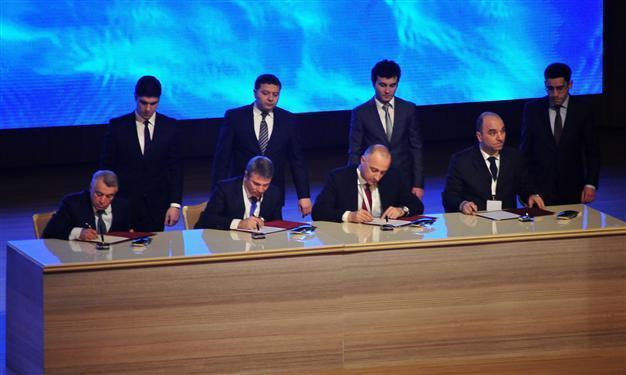Azerbaijan opens 'strategic door' to send gas to Europe
BAKU - Reuters

The Shah Deniz II consortium signed off on the final decision worth about $28 billion (20 billion euros) of investment that triggers the start of construction of a key new pipeline route from the Caspian Sea to Europe. AA Photo
Backers of Azerbaijan’s Shah Deniz II gas project signed a final investment decision today, scaling up its status as an alternative gas transit route to Europe as the continent tries to wean itself off Russian energy supplies.Azeri President Ilham Aliyev told a ceremony in the capital Baku that the project extension “will change the energy map of our region and help the historical development of our country”.
The European Commission said the decision to go ahead with enlargement of the scheme could see it supplying 20 percent of European Union needs in the long term.
Gas shipments via Ukraine have been a focus of EU and Russian anxiety for years and especially since 2009, when a pricing dispute with Russia led to a cut-off of gas supplies to EU customers.
Since then, Europe has sought new suppliers and to bring Ukraine into its orbit, while Russia has fought to retain its influence over Kiev and to build alternative supply routes to safeguard deliveries to its European customers.
The documents signed in Baku include an investment decision on Shah Deniz II, as well as the Trans-Anatolian (TANAP) and Trans-Adriatic (TAP) gas pipeline projects. Combined, the projects will cost $35 billion, Aliyev said.
Project partner Statoil of Norway accompanied its announcement on the go-ahead with news it would reduce its stake in the consortium to 15.5 percent from 25.5 percent.
Statoil’s move will increase the ownership proportions of the remaining players and fits a trend among top oil companies to rein in spending by focusing on fewer big projects.
Statoil will sell the 10 percent to operator BP and Azeri state energy firm SOCAR for $1.45 billion in cash.
“It’s a very good price ... The price is three times book value while Statoil shares are traded at 1.3 times book value,” said John Olaisen, an analyst at brokerage ABG Sundal Collier in Oslo. Other analysts said investors would welcome the move.
BP Azerbaijan and the consortium said SOCAR and its partners in Shah Deniz II had agreed to extend terms for the project by 12 years to 2048.
From around 2019, Shah Deniz II is expected to supply 16 billion cubic meters (bcm) per year to Europe, including 6 bcm for Turkey.
Alternative to Russia
European buyers have struggled to find alternatives to Russian gas producer Gazprom, whose contracts link prices to oil, generally making it expensive compared to the spot market.
Gazprom covers a quarter of Europe’s gas needs, with more than 150 bcm of exports a year. In response to Europe’s quest for Caspian supply, Gazprom proposed its $39 billion South Stream project, which would pipe gas to northeast Italy through the Black Sea starting at the end of 2015.
The European Commission has said it does not oppose Russia’s plans to diversify supply routes, bypassing Ukraine, but says they have to conform with EU law and are far from doing so.
“Shah Deniz II and the Southern Corridor pipelines will not only change the energy map, but will give customers in Europe direct access to the gas resources of Azerbaijan for the first time,” Bob Dudley, BP’s group chief executive, said at the signing ceremony today.
Earlier this year, SOCAR and partners including BP and Statoil selected the TAP for potential gas deliveries to Europe over its Austria-based rival Nabucco West.
TANAP will be built from the Turkish-Georgian border to Turkey’s border with Europe, with its preliminary total cost estimated at $20 billion.
Buyers of Azeri gas from Shah Deniz II are Shell, Bulgargas, Gas Natural Fenosa, Greek DEPA, Germany’s E.ON ,France’s GDF Suez, Italian regional utility Hera Trading, Switzerland’s AXPO and Italy’s Enel.
Turkey aims 30 pct stake in TANAP
ANKARA/ISTANBUL – Reuters
Turkey aims to increase its stake in the Trans-Anatolian natural gas pipeline project (TANAP) from 20 percent to 30 percent, Energy Minister Taner Yıldız told Reuters late Dec. 16.
“Our stake in TANAP is currently 20 percent and we want to raise it to 30 percent. We’ll have talks for it in Baku,” he said. The company, which aims to reduce its stake, offered Shahdeniz II consortium members, BP, Statoil and Total to sell a part of its stakes. The sources said BP, meanwhile, is considering a further boost to its stake on top of the 12 percent agreed.
Rovnag Abdullayev, head of SOCAR, said on Dec. 10 that Turkey’s stake would be increased at the expense of stakes offered to Statoil and Total.
















